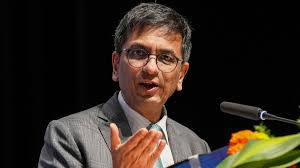Justice DY Chandrachud, who demitted office as the 50th CJI on November 10, leaves behind a legacy of reshaping the country’s jurisprudence. He oversaw landmark judgments on issues like Sabarimala temple entry, decriminalization of same-sex relations and electoral bonds. A report by Mudit Mathur

The tenure of the 50th Chief Justice of India, Dhananjaya Y.Chandrachud, has been marked by significant contributions to the country’s legal infrastructure and jurisprudence. His commitment to upholding individual rights, promoting social justice, and strengthening constitutional governance has left a lasting impact on India’s judicial system.
Chandrachud demitted his office on November 10, leaving behind an indelible legacy of reshaping the landscape of the country’s jurisprudence and reforming it to new heights in constitutional law, and human rights that reflects a broader vision of justice aligning with the evolving values of society. President Draupadi Murmu administered the oath of office to new CJI Sanjiv Khanna on November 11.
Many jurists showered praises on Justice Chandrachud for his intellectual prowess, progressive judgments, and for bringing about technological reforms in the judiciary. His landmark judgments on issues like women’s entry into temples, decriminalization of adultery and same-sex relations, privacy rights, rights to free speech and electoral bonds have been commended by society at large. His mastery of constitutional law, history, and sociology has been widely acknowledged.
Justice Chandrachud demonstrated judicial compassion in cases involving child rights, disability rights, and social justice. His tenure has been marked by significant efforts to reform the judicial system in India. One of his notable contributions is the introduction of technological reforms, such as virtual courts, e-filing, and live streaming of court proceedings, aimed at improving accessibility and transparency. He vigorously pushed the e-courts project to modernise the judiciary of the country.
Justice Chandrachud pioneered virtual courts, enabling remote hearings and reducing the need for physical presence in court rooms. He implemented e-filing systems and live streaming of court proceedings to enhance transparency and accessibility.
Besides introducing the Inter-Operable Criminal Justice System (ICJS), a system aimed at integrating various stakeholders in the criminal justice system, Justice Chandrachud also oversaw the development of the NJDG, a digital platform for tracking court cases and improving judicial efficiency. These reforms have improved the efficiency and accessibility of the judicial system. However, his critics argue that more needed to be done to address the systemic issues plaguing the Indian judiciary, such as delays, backlogs, and corruption.
CJI Chandrachud’s relations with the Central Government have been critical of the government on several occasions, pulling up the Central government counsel in significant cases but despite that, he faces criticism for the Supreme Court’s handling of sensitive cases as master of rosters, and the lack of diversity and opaqueness in functioning of the judiciary remain pressing concerns. Justice Chandrachud faced allegations of violating listed rules by moving politically sensitive cases to the select benches.
The collegium headed by CJI Chandrachud has made its views clear on the government rejecting or returning names already reiterated, ensuring more transparency in the appointment process by putting the government’s reservations on its website but his approach to judicial appointments sparked debate within the legal community.
His landmark judgements that reshaped the jurisprudence of the nation include Justice K.S. Puttaswamy v Union of India (Privacy Case, 2017) wherein it was held that passing the Aadhaar Act as a Money Bill was a fraud on the Constitution.
His judgement on the Ayodhya dispute drew criticism when he said it was inspired by God (M Siddiq v Mahant Suresh Das (Ayodhya Title Dispute) (2019) as part of the unanimous five-judge bench decision, the court granted the disputed land to Shri Ram Virajman while ensuring justice for all parties.
In the Association for Democratic Reforms v Union of India (Electoral Bonds Case) (2024), the five-judge bench declared the Electoral Bonds Scheme unconstitutional for violating the right to information under Article 19(1)(a). The Bench held that the Scheme violated the voters’ right to information enshrined in Article 19(1)(a) of the Constitution.
In the matter of Sita Soren v Union of India (Legislative immunity for lawmakers facing bribery charges) (2024), a seven-judge bench unanimously overruled the P.V Narasimha Rao case, holding that lawmakers don’t enjoy parliamentary immunity for bribery under Articles 105(2) and 194(2). This judgment strengthened anti-corruption measures in legislative bodies.
The historic judgment in Navtej Johar v Union of India (2018) case decriminalized homosexuality as Justice Chandrachud’s concurring opinion declared Section 377 unconstitutional.
The legacy of Justice D.Y. Chandrachud will indubitably continue to influence future generations of legal practitioners and scholars. His landmark judgments not only serve as important precedents in Indian law but also mark the judiciary’s role in nurturing democracy and upholding human rights. His legacy will inspire future leaders in the legal domain to advocate for justice, equity, and constitutional integrity in their pursuit of a just society













